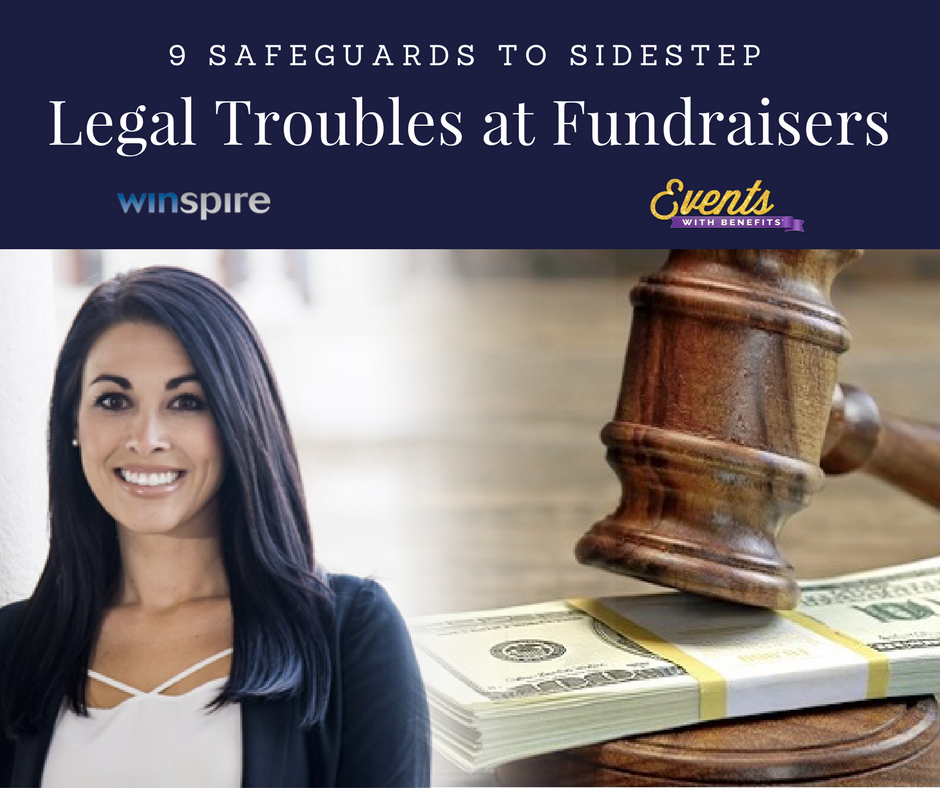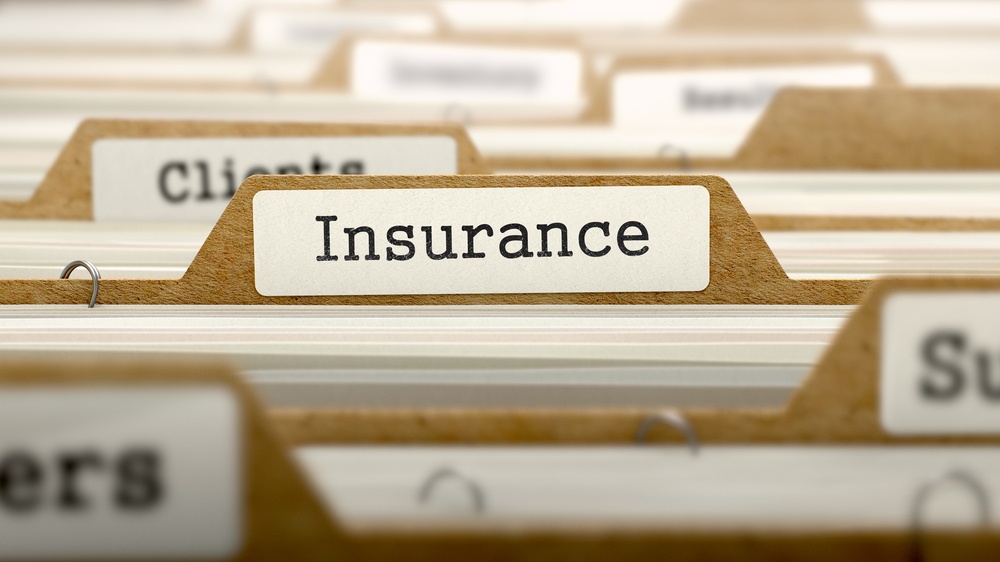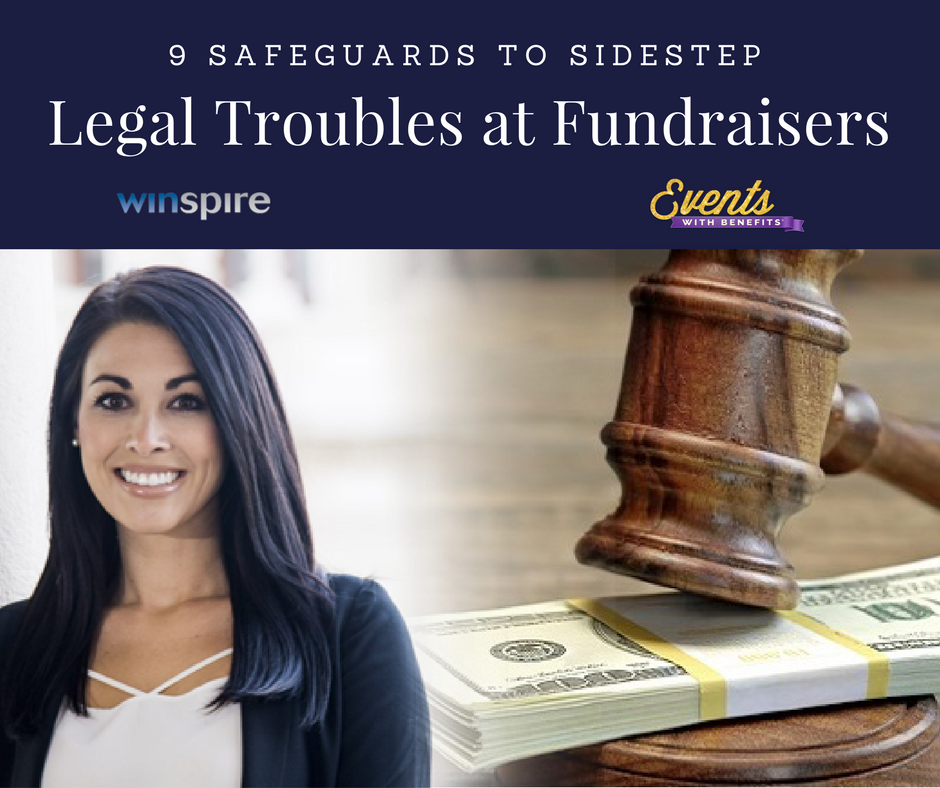
However, if low bids, sloppy mistakes or an unenthusiastic audience seem like worst case scenarios – you’ll want to read on.
Ever considered the consequences of holding an unauthorized raffle? What if a donor gets injured on the golf course? How about the illegal or irresponsible sale of alcohol at the annual gala?
We don’t like to think about these “what if’s”, but legal troubles cause much more than a one-time revenue hit – they can put good nonprofits in financial jeopardy.
Fortunately, a little preparation now can spare you major headache down the road. To gain insight, we sat down with Mary Tovella-Dowling, an attorney at For Purpose Law Group in San Diego, Calif., for a recent episode of Winspire’s podcast Events with Benefits.
Tovella-Dowling offers invaluable, money-saving preventive measures for charities to take before getting into hot water due to disputes or accidents. Learn why and how to…
- Seek legal advice
- Comply with local, state and federal laws
- Properly insure events (and volunteers)
- Serve alcohol responsibly
- Protect yourself with corporate sponsorship contracts
- Register raffles, big and small
…and more! Learn the actions to take now, to protect your nonprofit’s sustainability for years to come.
Safeguard 1: Legal counsel.
As a Winspire News reader, we know you have a huge heart for furthering important causes. Registration requirements for a raffle might seem like minutiae. Wouldn’t it be nice if legal entities took it easy or looked the other way for charities?
“One of the biggest misconceptions nonprofits have is that they’re not operating like any for-profit business, and as a result aren’t subject to the same scrutiny of laws. That’s simply not true,” asserts Tovella-Dowling.
Talk about the need for charities to “think like a business!”

Seek legal oversight from either in-house lawyers or general counsel, who can help your event obtain proper permits, insurance policies and contracts (more on these below), and protect yourself from potential legal pitfalls.
It’s much easier to stay out of hot water than get out of it. Your first step to avoiding future litigation is to get ducks in a row well in advance.
Safeguard 2: State-specific counsel.
“You may have to check with your state’s attorney general, IRS, state tax board, or a department overseeing the general trust, like the Secretary of State,” Tovella-Dowling says.
Find out what the requirements are for reporting and registering events. What are the deadlines? Do you have to file any kind of follow-up paperwork to show how much money you made and how it will be used? Are you compensating individuals that are carrying out the event, like a raffle?
These are considerations a nonprofit needs in the back of their head when planning their event.
Safeguard 3: Event insurance riders.

“So many times I have clients come to me after a fundraising event, and someone from the general public came and fell at the event, or some other injury, or dispute. Trying to defend a lawsuit of something that happened at that event will drain the assets of the nonprofit itself,” Tovella-Dowling cautions.
To avoid this, make sure you have a general commerical liability policy that can cover any unfortunate accident that happens at the event. These are called insurance policy riders, or add-on provisions to basic policies that provide additional benefits specific to your situation.
Safeguard 4: Volunteer insurance riders.
Another insurance policy rider you’ll want to include is coverage for volunteers.
“As you know, nonprofit fundraising events are primarily run by volunteers, so you want to make sure your policy covers any of the acts of the volunteers during your event, Tovella-Dowling advises.
Safeguard 5: Adequate coverage.

The actual cost depends on nature and size of your organization, says Tovella-Dowling. If you’re a small startup organization, you can get a very good solid commerical policy for under $2,000 a year.
As your organization grows, programs expand and you take on more staff members, you have to think about adding more and more riders onto your policy (like insuring directors and officers).
The growth of your coverage does add additional expenses, but like most insurance policies, the cost ends up being a pittance compared to what could happen without them.
Safeguard 6. Corporate sponsorship contracts.
We’ve noted before how critical it is to secure enough event sponsorships to meet your event goals. Local businesses and individuals can offer in-kind donations, cash donations or underwrite expenses in exchange for the benefits of corporate sponsorship, like media coverage.
“Like any business transaction, when you first agree to the sponsorship, no one intends to have a legal dispute. You form a parntership because you’re all on great terms,” Tovella-Dowling says. “Things don’t always stay that way in the end.”
To avoid misunderstandings, make sure all of the agreements are clearly memorialized in a written contract, she advises.
By having the intents of both parties clear from the get-go, potential disputes can be avoided or resolved without draining the resources of either party.
Safeguard 7. Drink tickets (and other smart moves when serving alcohol).
Have you ever taken a congratulatory bottle of champagne to the table of a successful live auction bidder? It’s an easy way to recognize the gift and make the bidder feel great about donating to your cause – but is it safe?

The trick is to show your nonprofit is taking careful steps to avoid potential overserving or overconsumption in donors.
Some possible steps to take:
- Pass out drink tickets. This shows you’re limiting how much is served.
- Observe vendors carding. Don’t give alcohol to anyone under the age of 21.
- Include disclaimers on the tickets or registration page. Warn donors of the risk of overconsumption.
While donor behavior is not the responsibility of your nonprofit, show you’re doing everything possible to, as they say, “enjoy responsibly.”
Safeguard 8. Registration for raffles, big and small.

Unfortunately, the penalties for failing to comply with state laws in regards to raffles can be steep.
Any time you intend to engage in a raffle, there are registration requirements you must adhere to. This could be regulations set by your attorney general, state registry or department of charitable trust.
Avoid the penalties – on both your organization and individual directors and officers – by properly registering your raffle. This may require renewal reports, registration forms, registration for commercial co-ventures and more. Be sure to ask your legal counsel to advise on your specific situation.
{{cta(’02ef0822-9c68-40d2-921b-2fc2ed3ed33f’,’justifycenter’)}}
Here are some general tips for registering raffles.
Does this include the 50/50 raffle or other giveaways we have at the event?
The short answer, is yes. Any raffle, where you sell a ticket in exchange for a chance to win, is under the proper registration requirements; size is not a factor.
“Raffles are actually considered gambling, and for-profit businesses are not allowed to host raffles at all,” Tovella-Dowling explains. “Raffles are an exemption for charities under the law.”
What about an opportunity drawing?
That could work, as long as it’s a true giveaway. “One pitfall I’ve seen clients fall in before is thinking they’ve exchanged the raffle ticket for other goods: membership to an organization, services, products. That’s still considered something of legal value and technically a ‘sale’,” says Tovella-Dowling.
So if you’re going to do an opportunity drawing, make sure nothing of legal value is being exchanged for a chance to win.

Again it depends on your state.
In California, you must register for upcoming raffles by November of each year, says Tovella-Dowling. However, many times nonprofits don’t realize they will be engaging in a raffle until much sooner.
Just remember: It’s never too late.
“Just seek compliance,” Tovella-Dowling urges. “The attorney general and state agencies are really big on transparency. Even if there are penalties for a late registration, it’s in your best interest to register.”
Bottom line: Following the law might seem time-consuming, but imagine the alternative. Could nonprofits function with integrity if any group could make money off a raffle without maintaining full disclosure of the funds?
“You want your nonprofit to display to the public that you’re soliciting charitable funds to further a charitable, educational, scientific, or some other legally exempt purpose,” Tovella-Dowling emphasizes.
“If a nonprofit has the intent of transparency, that’s always better than not following the rules – even if you’ve done it late.”
Hear the rest on Events with Benefits
This is just the first half of our session with Mary Tovella-Dowling. It’s the extensive coverage we have had on potential legal ramifications of fundraising events at Winspire News, so you won’t want to miss her invaluable advice.
Listen to the podcast episode below, or visit the full site here.
{{cta(‘639b168b-df3f-4dd6-b2ef-ae20cd598be3′,’justifycenter’)}}


